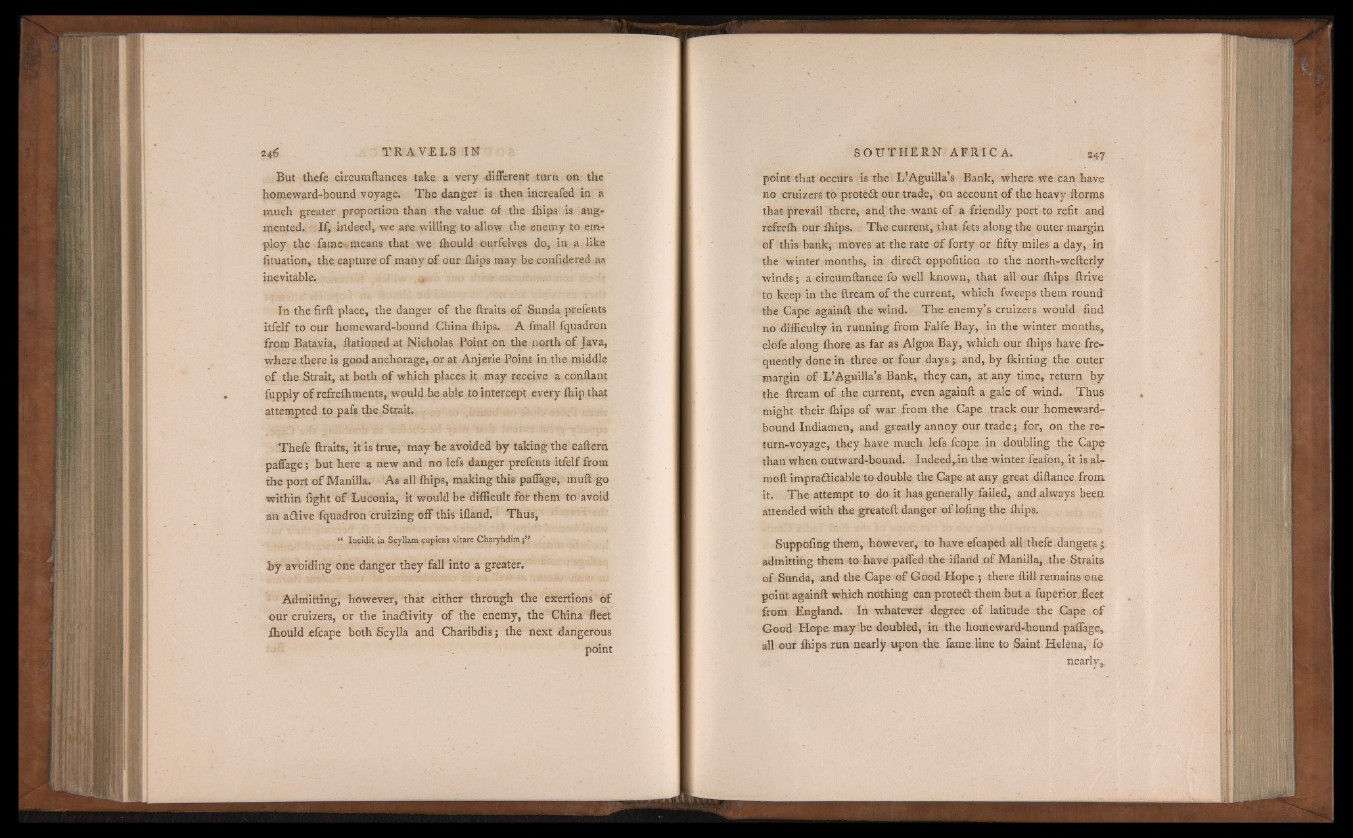
But thefe circumftances take a very different turn on the
homeward-bound voyage. The danger is then increafed in a
much greater proportion than the value of the ihips is augmented.
Jf, indeed, we are willing to allow the enemy to employ
the fame-, means that we ihould ourfelves do, in a like
fituation, the capture of many of our ibips may be confidered as
inevitable. g)
In the firft place, the danger of the ftraits of Sunda prefents
itfelf to our homeward-bound China ihips. A fmall fquadron
from Batavia, ftationed at Nicholas Point on the north of Java,
where there is good anchorage, or at Anjerie Point in the middle
of the Strait, at both of which places it may receive a conftant
fupply of refreihments, would be able to intercept every Ihip that
attempted to pafs the Strait.
Thefe ftraits, it is true, may be avoided by taking the eaftern
paffage; but here a new and no lefs danger prefents itfelf from
the port of Manilla. As all Ihips, making this paffage, muft go
within fight of Luconia, it would be difficult for them to avoid
an a ¿five fquadron cruizing off this ifland. Thus,
| | Incidit in Scyllam cupiens vitare Charybditn j”
by avoiding one danger they fall into a greater.
Admitting, however, that either through the exertions of
our cruizers, or the inadtivity of the enemy, the China fleet
ihould efcape both Scylla and Charibdis ; the next dangerous
point
point that occurs is the L ’Aguilla’s Bank, where we can have
no cruizers to protedf our trade, on account of the heavy ftorms
that prevail there, and_ the want of a friendly port to refit and
refreih our ihips. The current, that fets along the outer margin
of this bank, moves at the rate of forty or fifty miles a day, in
the winter months, in direct oppofition to the north-wefterly
winds; a circumftance fo well known, that all our ihips ftrive
to keep in the flream of the current, which fweeps them round
the Cape againft the wind. The enemy’s cruizers would find
no difficulty in running from Falfe Bay, in the winter months,
clofe along fhore as far as Algoa Bay, which our ihips have frequently
done in three or four days y and, by ikirting the outer
margin of L’ Aguilla’s Bank, they can, at any time, return by
the ftream of the current, even againft a gale of wind. Thus
might their ihips of war from the Cape track our homeward-
bound Indiamen, and greatly annoy our trade; for, on the re-
turn-voyage, they have much lefs fcope in doubling the Cape
than when outward-bound. Indeed,.in the winter feaibn, it is al-
moft impraiticable to double the Cape at any great diftance from
it. The attempt to do it has generally failed, and always been
attended with the greateft danger of loiing the ihips.
Suppofing them, however, to have efoaped all thefe dangers ;
admitting them to have paffed the ifland of Manilla, the Straits
of Sunda, and the Cape of Good Hope ; there ftill remains one
point againft which nothing can protect them but a fuperior. fleet
from England. In whatever degree of latitude the Cape .of
Good Hope may be doubled, in the homeward-hound paffage,
all our ihips run nearly upon the fame, line to Saint Helena, fo
nearly*